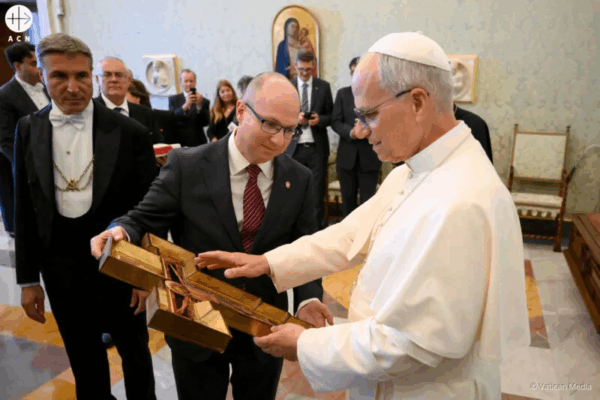Lebanon is still recovering from years of conflict and economic turmoil. The Pope’s visit is a sign that the local Church is not forgotten, and highlights the country’s unique role in the region.
The Church in Lebanon hopes that Pope Leo’s presence will help secure justice for the victims of the 2020 Port explosion, which remains unsolved.
In a conference organised by Aid to the Church in Need (ACN) the Melkite Archbishop of Beirut, Georges Wadih Bacouni, said that the Pope’s decision to visit the port is unusual and highly significant, as will be his visit to a large psychiatric hospital.
“The Pope’s visit to the Memorial of the Port Explosion Martyrs and his visit to Holy Cross Monastery Hospital are very exceptional. This is not something popes normally do. When Pope John Paul II and Pope Benedict visited Lebanon, their programs did not include particular places of pain or to centers caring for the most vulnerable.”
The archbishop believes that all Lebanese appreciate the Pope’s gesture. “They feel that the Pope is coming close to their wounds and close to the people who suffer the most. These two stops have a deep emotional importance for the Lebanese. His message is clear: their pain is not forgotten.”
Regarding the port explosion, which levelled a large part of the Christian sector of Beirut and killed over 200 people, Archbishop Bacouni regrets the lack of findings. “The judge who is leading the investigation has been blocked. The judiciary system is paralysed due to the intervention of the politicians.”
“But the families of the victims have the right to know! Hundreds were killed, and thousands were injured, there was a lot of damage, but until now, after five years, we know nothing. It’s incredible,” says Archbishop Georges Bacouni.
Marielle Boutros, project coordinator for ACN in Lebanon, explains that even though the Port blast affected people of all religions, “today the Church is one of the few institutions asking for justice for the victims. And the Church is asking for justice for all communities, not only for the Christians.”
Regarding the psychiatric Hospital of the Holy Cross, run by Franciscan sisters, Marielle Boutros explains that “the Pope wants to visit the patients and those who are assisting them, because there are some very difficult cases, and they cannot bring them to see the Pope”. The hospital is a project partner of ACN, which has supported it financially during the years of financial crisis in Lebanon, ensuring that it can continue to care for its patients, many of whom have been abandoned by their families.
No risk for the Pope
Pope Leo XIV wished to add Lebanon to the itinerary of his first international trip, which includes Turkey, despite the instability the country has suffered for the past several years, including a recent war between Israel and Hezbollah based in south Lebanon. Only days ago, Israel conducted an airstrike against a target in Beirut, but Archbishop Bacouni insists that there is no risk for the Pope.
“All the preparations, including security, are done in collaboration between the Vatican and the Lebanese security forces. We have been working for this for months, and we are sure that the situation is fully secure.”
Marielle Boutros says that Pope Leo will be meeting with people who are full of faith, but exhausted with the trials they have been facing for so many years. “The lack of justice, the war, repeated crisis, strikes on Lebanon… Many families feel that they are surviving but with little hope for the future. There is a mix of fatigue and resilience. Among the young people, there is a strong desire to stay and to build something meaningful in this country. But there is also a real fear of not having opportunities and lack of security. Many of them are torn between love of country and the pressure to leave,” she explains.
“So, this visit of His Holiness is not simply symbolic, it is a concrete sign that Lebanon is not forgotten and that the universal Church stands firm with Lebanon,” she concludes.
Pope Leo XIV will arrive in Lebanon on 30 November and returns to Rome on 2 December. Besides his visit to the psychiatric hospital and the memorial to the victims of the Port explosion, he will also pray at the tomb of saint Charbel and have meetings with politicians and representatives of other religions.


